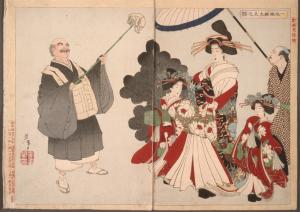As it turns out Rick McDaniel has a new book coming out, The Story of Zen. And he invited the Zen teacher Dosho Port to write an afterword for it. Always looking for the easier way Port Roshi posted a query to Facebook asking what any of his Zen friends might consider the single greatest challenge together with the single greatest opportunity for Zen in the West today?
A compelling question. And, I believe, timely. We are at the edge of a great transition where the first full on generation of convert Western Zen practitioners are beginning to die and new leadership is beginning to emerge. I look forward, as I always do, to Rick’s forthcoming book. And with that to Dosho’s always insightful distillation of his research and reflection in that afterword.
As I write this there were sixty-odd comments. Glancing at the list and sorting for the people who have opinions unencumbered by much actual experience, the results showed a few patterns.
Probably the most important comment was the observation that the problems, the opportunities and the challenges ultimately remains the same across time and culture: “awakening to our true nature.” I very much resonated with that, and with it the underscoring we are about something precious and true. And, that this great project must engage the realities of the specific times and places.
Much of the rest in no particular order:
Concerns with hierarchy, and with that the place of lay practice and gender equality.
And, I suspect paired, concerns about maintaining authentic communities of practice and the development of truly mature practitioners and masters of the way.
Sexual and other ethical concerns, mostly focused on teachers.
Concerns about the relatively narrow population that has been called into the practice up to this point, and the lack of significant numbers of people of color and folk arising out of the working classes.
The commodification of Buddhist practice writ large, together with the various issues of how Zen, its teachers and communities find “right livelihood” in a nonBuddhist environment.
Zen’s encounter with Western psychology (and I would add Abrahamic religions).
Concerns with how best to engage the issues of the moment, with two strong poles: one holding up the pressing concerns of ecological catastrophe and profound human need and the other lamenting the overwhelming inclination among Western Zen’s current leaders toward the “left” of contemporary Western politics. A growing tension.
I would add in some questions about the tensions between the varieties of Zen in the West, and Zen and other Buddhist communities. I’m also concerned with the disconnect between actual practice and an abstract “Zen as whatever one wants” that is rife on the inter webs. Sometimes that Zen of momentary pleasure seems to be the dominant understanding here in the West.
Personally, I would underscore the principal point: Zen is a tradition of engaging our true nature. It brings with it a bundle of practices and pointers. It also brings some baggage. What that baggage is, however, is not actually as obvious as some might think. Similarly, there are opportunities and traps within our Western culture enthralled as it is with the capitalist vision of profit and, frankly, the range of opportunities given our relative wealth in this moment.
I join those concerned with our near monolithic identification with the contemporary West’s leftist analysis. The lack of any significant alternative views gives me pause and opens a conundrum. On the one hand, I largely agree with that analysis. I believe we are indeed facing an ecological catastrophe of unspeakable proportion. And, and, I cannot see any appropriate ethical response to two terrible ills, the inequalities of wealth and how it perpetuates conditions of oppression, and some atavistic and poisonous desire to identify and suppress various “others” as the source of our societal ills – other than within the broad perspectives of the contemporary political left. While I feel confident in the analysis of the problem, again, the near unanimity of my cohort in how to address this, suggests problems. I just don’t feel right when everyone agrees. Either there’s a problem in the analysis, which is necessarily limited by that unanimity of view, or, perhaps in the solutions – which to me seem more obviously complicated than are often offered.
How does a fish become aware of the water in which it swims?
The part I am confident of is that turning away from the world is not going to be a significant part of Zen’s engagement in the West. And, of course, even with incomplete information we’re not excused from responding to the moment.
So, a mess. Our mess…
My point in the moment is that we hold a precious treasure in our hands. And, we need to engage it humbly. I find it helps to know everything passes, everything dies. And, everything contains the whole of the cosmos in that moment. Whether it be joyful or horrific, this is it.
I personally take some comfort in knowing we will fail. After all we all die.
And. I feel so lucky, so fortunate to have found this practice that drives me to ever greater depths of authenticity, that holds up my mind and heart in a mirror so sharp as to to be unavoidable. And, that in some precious moments shatters, revealing the pastures of heaven, the wonder of the pure land.
And, I’m glad people care and engage and it really does look like this little experiment in a contemplative tradition rooting in our culture will be around for a while, yet.
Rubbing our noses in the real…













